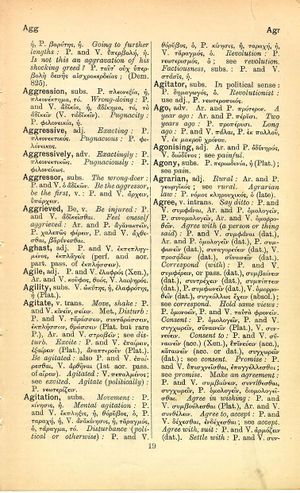agitator
αἰτήσεις ἀκοὐεις σῶν ἱκετῶν· ταχἐως συνδραμεῖς ἀναπαὐων εὐεργετῶν· ἰάματα παρἐχεις, Ἱερἀρχα, τῇ πρὀς Θεὀν παρρησἰᾳ κοσμοὐμενος → You hear the prayers of your suppliants; quickly you come to their assistance, bringing relief and benefits; you provide the remedies, Archbishop, since you are endowed with free access to God.
English > Greek (Woodhouse)
subs.
In political sense; P. δημαγωγός, ὁ.
Revolutionist: use adj., P. νεωτεροποιός.
Latin > English (Lewis & Short)
ăgĭtātor: ōris, m. id., pr.
I he that puts a thing in motion; used exclusively of those who drive animals (asses, horses, etc.), a driver (cf. agaso): agitator aselli, poet. for a peasant, Verg. G. 1, 273: equorum Achillis, i. e. the charioteer, id. A. 2, 476: sustineat currum ut bonu' saepe agitator equosque, Lucil. p. 154 Müll.—Hence,
II Esp., a charioteer, a combatant in the games of the circus, Plaut. Men. 1, 2, 50: ego ut agitator callidus, priusquam ad finem veniam, equos sustinebo, Cic. Ac. 2, 20; Suet. Calig. 55; so Inscr. Orell. 2593 sq.: agitatores consopiti sunt, Vulg. Nah. 2, 3.
Latin > French (Gaffiot 2016)
ăgĭtātŏr,¹³ ōris, m. (agito),
1 conducteur de chars [dans les jeux publics] : Cic. Ac. 2, 94 ; Sen. Ep. 30, 13 ; Plin. Min. Ep. 9, 6, 2 ; [d’un char de guerre] Virg. En. 2, 476 ;
2 celui qui pousse devant lui du bétail : tardi agitator aselli Virg. G. 1, 273, le paysan qui pousse son âne à la marche lente.
Latin > German (Georges)
agitātor, ōris, m. (agito), der Treiber eines Tieres aselli, Verg. georg. 1, 273. Col. 7, 1, 3: equorum, Pferde-, Wagenlenker, Verg. Aen. 2, 476 (u. so absol., Vulg. Nah. 2, 3). – bes. (absol.) = der Wagenlenker (auriga) beim Wettrennen in den zirzensischen Spielen, Plaut. Men. 160. Lucil. sat. fr. inc. 155. Cic. Acad. 2, 94. Sen. ep. 30, 13. Corp. inscr. Lat. 6, 10048, 1 u. 6, 10057, 3.
Latin > English
agitator agitatoris N M :: driver, charioteer; one who drives (animals)

